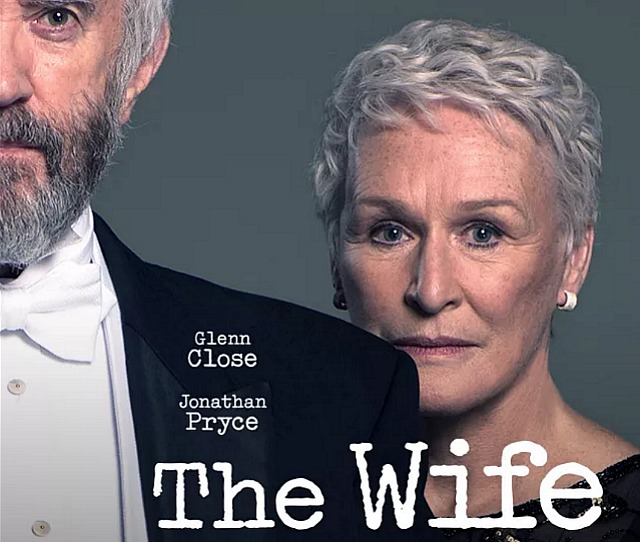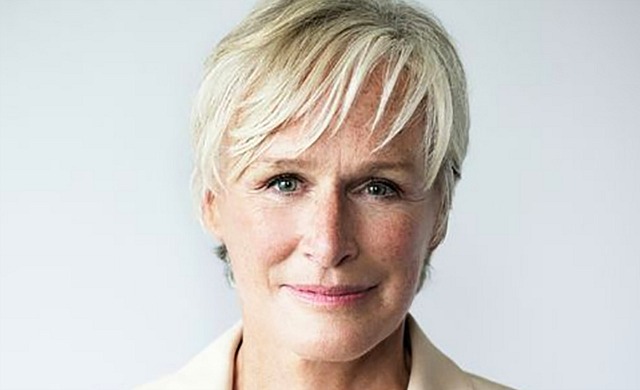Like all rewarding, well-crafted dramas, Bjorn Runge‘s The Wife is a giver, not a taker. Set in the mid ’90s, it’s about a successful lifelong partnership, begun in the mid ’50s, in which the aging junior partner — Joseph Castleman (Jonathan Pryce), a Saul Bellow-like novelist — gets all the credit while the senior partner — his wife Joan (Glenn Close) — is repeatedly praised for being loyal and supportive.
Joan is a familiar, quintessential character — the discreet, classy, long-under-valued wife and partner of an ostensibly great man. The difference is that she’s fuming.
The story tension in The Wife is about Joan’s poise becoming more and more challenged when she, Joseph and their frustrated, pissed-off son, David (Max Irons) fly to Stockholm to accept the ultimate honor of Joseph’s professional life — the Nobel Prize for literature.

Runge’s film, based on a screenplay by Jane Anderson and based on Meg Woltizer‘s same-titled novel, is actually more of a suspenser than a marital drama. For it’s clear early on that Joan is Mount Vesuvius, and that it’s just a matter of time before Pompeii will be covered in volcanic ash.
The problem, in a nutshell, is that Joseph isn’t as gifted as the world believes, and that the Castleman clan wouldn’t be in Stockholm (or, for that matter, enjoying any kind of flush lifestyle) were it not for Joan’s writing acumen and in fact genius, particularly her skillful reassembling and upgrading of Joseph’s servicable but no-great-shakes prose.
For The Wife to work, you have to throw in with young Joan (Anne Starke) early on, and the likelihood (which she’s had explained to her by an older female author, played by Elizabeth McGovern) that her career as a gifted writer will never come to fruition, given the sexist, male-favoring mindset of the Eisenhower-era publishing industry.
As the film hops back and forth between the ’50s and the ’90s, you come to understand that Joan has accepted a frustrating deal in order to enjoy at least a measure of second-hand recognition and material payoff for her literary gifts. It’s a devil’s bargain that she’s found a way to live with, but when the Nobel people come calling, the veneer begins to fray.
If you ask me Close’s Wife performance is a crown jewel — her finest and hookiest since Fatal Attraction‘s Alex Forrest, which of course happened over three decades ago, and before that the motherly Jenny Fields in The World According to Garp (’82).
She’s been Best Actress-nominated six times (for these two plus her performances in The Big Chill, The Natural, Dangerous Liaisons, Albert Nobbs) and you’d better believe Close will be nominated for Joan Castleman also.

As we speak seven Gold Derby spitballers have her at the top of their Best Actress lists, and 21 out of 26 have Close listed among their top five. So yeah, it’s about time.
Except Close has three Oscar narratives behind her this year — (a) overdue for a win, (b) she gives a well-honed, note-perfect performance in The Wife, and (c) Joan Castleman is a metaphor for untold millions of similar somewhat lopsided arrangements that generations of 20th Century women have settled for.
The Hollywood Reporter‘s Jon Frosch wrote that Close’s performance is “like a bomb ticking away toward detonation” — perfect. But she’s not just playing her husband’s better in terms of talent and temperament. She’s playing every wife who ever felt under-valued, patronized or otherwise diminished by a swaggering hot-shot husband along with their friends and colleagues as well as — why not? — society as a whole.
The Wife is a solid double-A quality package — a tidy, well-ordered, somewhat conservative-minded, theatrical-style drama. Some say it’s a little too deliberate, but it’s as good as this sort of thing gets. It satisfies, add up, delivers.
Will the New Academy Kidz fall in line? They should. Brilliant acting is brilliant acting.
The metaphor of Close’s character — the brushed-aside but stronger, smarter and more talented wife who lets her fury out at the end — is everything. It fits right into the zeitgeist in a certain sense and is hugely popular with the silverhairs. On the other hand Close’s performance is huge all over. Really. She knows exactly how to do this.









